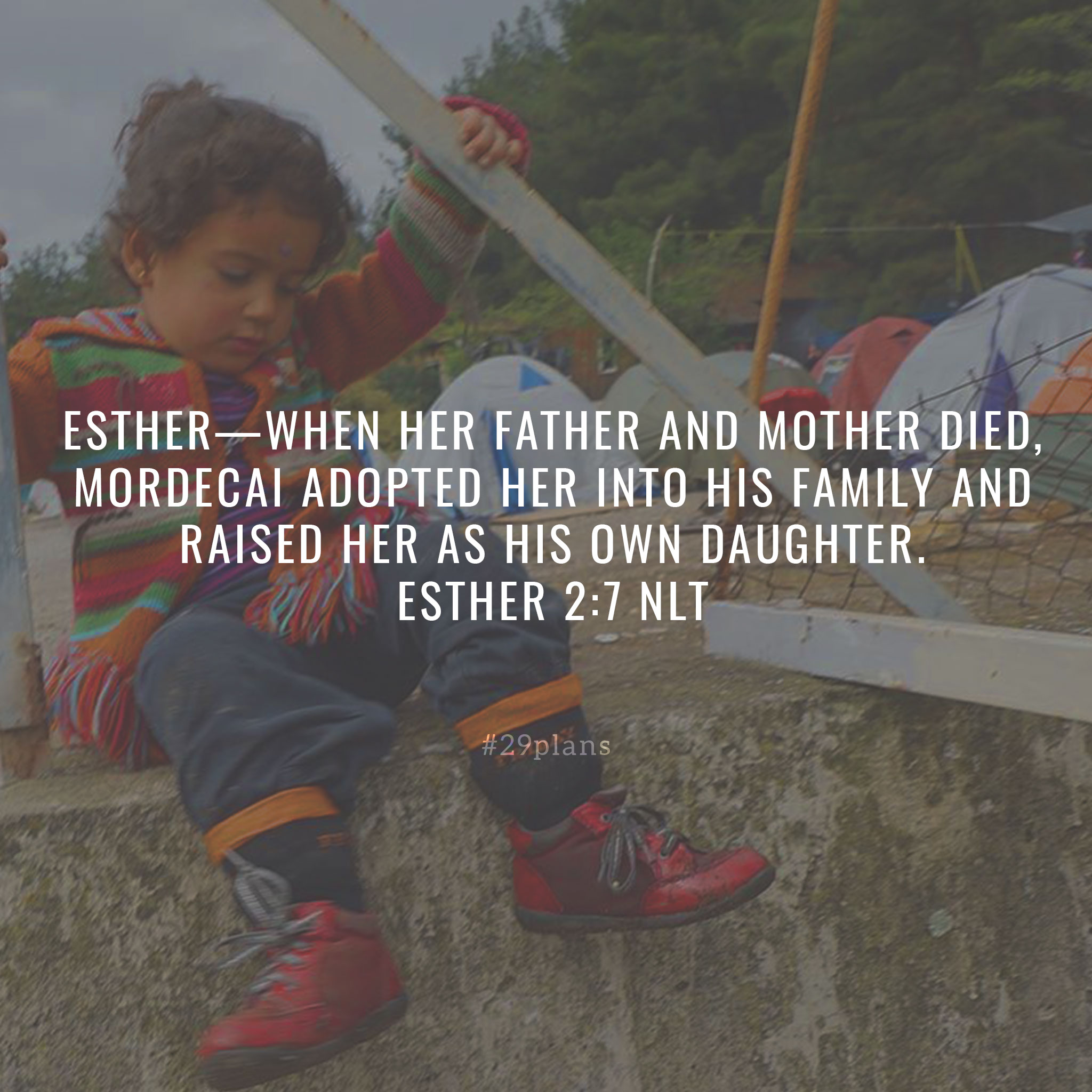Guide: Read Esther 2, 3; Listen to Orphan’s Song by @KarlaAdolphe; Pray for Orphans; What would you do in Mordecai’s position?
Verse of the Day: Esther—When her father and mother died, Mordecai adopted her into his family and raised her as his own daughter. Esther 2:7 NLT
Song of the Day: Orphan’s Song by Karla Adolphe — Youtube
Bible Reading: Esther 2, 3
Esther 2
Esther Becomes Queen
2 But after Xerxes’ anger had subsided, he began thinking about Vashti and what she had done and the decree he had made. 2 So his personal attendants suggested, “Let us search the empire to find beautiful young virgins for the king. 3 Let the king appoint agents in each province to bring these beautiful young women into the royal harem at the fortress of Susa. Hegai, the king’s eunuch in charge of the harem, will see that they are all given beauty treatments. 4 After that, the young woman who most pleases the king will be made queen instead of Vashti.” This advice was very appealing to the king, so he put the plan into effect.
5 At that time there was a Jewish man in the fortress of Susa whose name was Mordecai son of Jair. He was from the tribe of Benjamin and was a descendant of Kish and Shimei. 6 His family[a] had been among those who, with King Jehoiachin[b] of Judah, had been exiled from Jerusalem to Babylon by King Nebuchadnezzar. 7 This man had a very beautiful and lovely young cousin, Hadassah, who was also called Esther. When her father and mother died, Mordecai adopted her into his family and raised her as his own daughter.
8 As a result of the king’s decree, Esther, along with many other young women, was brought to the king’s harem at the fortress of Susa and placed in Hegai’s care. 9 Hegai was very impressed with Esther and treated her kindly. He quickly ordered a special menu for her and provided her with beauty treatments. He also assigned her seven maids specially chosen from the king’s palace, and he moved her and her maids into the best place in the harem.
10 Esther had not told anyone of her nationality and family background, because Mordecai had directed her not to do so. 11 Every day Mordecai would take a walk near the courtyard of the harem to find out about Esther and what was happening to her.
12 Before each young woman was taken to the king’s bed, she was given the prescribed twelve months of beauty treatments—six months with oil of myrrh, followed by six months with special perfumes and ointments. 13 When it was time for her to go to the king’s palace, she was given her choice of whatever clothing or jewelry she wanted to take from the harem. 14 That evening she was taken to the king’s private rooms, and the next morning she was brought to the second harem,[c] where the king’s wives lived. There she would be under the care of Shaashgaz, the king’s eunuch in charge of the concubines. She would never go to the king again unless he had especially enjoyed her and requested her by name.
15 Esther was the daughter of Abihail, who was Mordecai’s uncle. (Mordecai had adopted his younger cousin Esther.) When it was Esther’s turn to go to the king, she accepted the advice of Hegai, the eunuch in charge of the harem. She asked for nothing except what he suggested, and she was admired by everyone who saw her.
16 Esther was taken to King Xerxes at the royal palace in early winter[d] of the seventh year of his reign. 17 And the king loved Esther more than any of the other young women. He was so delighted with her that he set the royal crown on her head and declared her queen instead of Vashti. 18 To celebrate the occasion, he gave a great banquet in Esther’s honor for all his nobles and officials, declaring a public holiday for the provinces and giving generous gifts to everyone.
19 Even after all the young women had been transferred to the second harem[e] and Mordecai had become a palace official,[f] 20 Esther continued to keep her family background and nationality a secret. She was still following Mordecai’s directions, just as she did when she lived in his home.
Mordecai’s Loyalty to the King
21 One day as Mordecai was on duty at the king’s gate, two of the king’s eunuchs, Bigthana[g] and Teresh—who were guards at the door of the king’s private quarters—became angry at King Xerxes and plotted to assassinate him. 22 But Mordecai heard about the plot and gave the information to Queen Esther. She then told the king about it and gave Mordecai credit for the report. 23 When an investigation was made and Mordecai’s story was found to be true, the two men were impaled on a sharpened pole. This was all recorded in The Book of the History of King Xerxes’ Reign.
–
Footnotes:
- 2:6a Hebrew He.
- 2:6b Hebrew Jeconiah, a variant spelling of Jehoiachin.
- 2:14 Or to another part of the harem.
- 2:16 Hebrew in the tenth month, the month of Tebeth. A number of dates in the book of Esther can be cross-checked with dates in surviving Persian records and related accurately to our modern calendar. This month of the ancient Hebrew lunar calendar occurred within the months of December 479 B.c. and January 478 B.c.
- 2:19a The meaning of the Hebrew is uncertain.
- 2:19b Hebrew and Mordecai was sitting in the gate of the king.
- 2:21 Hebrew Bigthan; compare 6:2.
Esther 3
Haman’s Plot against the Jews
1 Some time later King Xerxes promoted Haman son of Hammedatha the Agagite over all the other nobles, making him the most powerful official in the empire. 2 All the king’s officials would bow down before Haman to show him respect whenever he passed by, for so the king had commanded. But Mordecai refused to bow down or show him respect.
3 Then the palace officials at the king’s gate asked Mordecai, “Why are you disobeying the king’s command?” 4 They spoke to him day after day, but still he refused to comply with the order. So they spoke to Haman about this to see if he would tolerate Mordecai’s conduct, since Mordecai had told them he was a Jew.
5 When Haman saw that Mordecai would not bow down or show him respect, he was filled with rage. 6 He had learned of Mordecai’s nationality, so he decided it was not enough to lay hands on Mordecai alone. Instead, he looked for a way to destroy all the Jews throughout the entire empire of Xerxes.
7 So in the month of April,[a] during the twelfth year of King Xerxes’ reign, lots were cast in Haman’s presence (the lots were called purim) to determine the best day and month to take action. And the day selected was March 7, nearly a year later.[b]
8 Then Haman approached King Xerxes and said, “There is a certain race of people scattered through all the provinces of your empire who keep themselves separate from everyone else. Their laws are different from those of any other people, and they refuse to obey the laws of the king. So it is not in the king’s interest to let them live. 9 If it please the king, issue a decree that they be destroyed, and I will give 10,000 large sacks[c] of silver to the government administrators to be deposited in the royal treasury.”
10 The king agreed, confirming his decision by removing his signet ring from his finger and giving it to Haman son of Hammedatha the Agagite, the enemy of the Jews. 11 The king said, “The money and the people are both yours to do with as you see fit.”
12 So on April 17[d] the king’s secretaries were summoned, and a decree was written exactly as Haman dictated. It was sent to the king’s highest officers, the governors of the respective provinces, and the nobles of each province in their own scripts and languages. The decree was written in the name of King Xerxes and sealed with the king’s signet ring. 13 Dispatches were sent by swift messengers into all the provinces of the empire, giving the order that all Jews—young and old, including women and children—must be killed, slaughtered, and annihilated on a single day. This was scheduled to happen on March 7 of the next year.[e] The property of the Jews would be given to those who killed them.
14 A copy of this decree was to be issued as law in every province and proclaimed to all peoples, so that they would be ready to do their duty on the appointed day. 15 At the king’s command, the decree went out by swift messengers, and it was also proclaimed in the fortress of Susa. Then the king and Haman sat down to drink, but the city of Susa fell into confusion.
–
Footnotes:
- 3:7a Hebrew in the first month, the month of Nisan. This month of the ancient Hebrew lunar calendar occurred within the months of April and May 474 B.c.; also see note on 2:16.
- 3:7b As in 3:13, which reads the thirteenth day of the twelfth month, the month of Adar; Hebrew reads in the twelfth month, of the ancient Hebrew lunar calendar. The date selected was March 7, 473 B.c.; also see note on 2:16.
- 3:9 Hebrew 10,000 talents, about 375 tons or 340 metric tons in weight.
- 3:12 Hebrew On the thirteenth day of the first month, of the ancient Hebrew lunar calendar. This day was April 17, 474 B.c.; also see note on 2:16.
- 3:13 Hebrew on the thirteenth day of the twelfth month, the month of Adar, of the ancient Hebrew lunar calendar. The date selected was March 7, 473 B.c.; also see note on 2:16.
Holy Bible. New Living Translation copyright© 1996, 2004, 2007, 2013 by Tyndale House Foundation. Used by permission of Tyndale House Publishers Inc., Carol Stream, Illinois 60188. All rights reserved.



